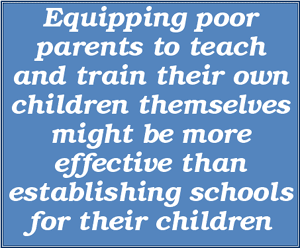Spreading a Biblical Model Worldwide
By Steve Hake
Printed in Practical Homeschooling #14, 1996.
 Steve Hake presents his ideas on Christian evangelism the "homeschool way".
Steve Hake presents his ideas on Christian evangelism the "homeschool way".

|
 |
 If you are convinced, as I am, that the essence of homeschooling is discipling our children as Jesus discipled the Twelve, then we as parents are not faced with a choice between two equally acceptable models: the school model and the discipleship model. The Bible is clear on this point. The Twelve were to be with Christ, become like Christ, and go out and preach Christ (Mark 3:14, Luke 6:40).
If you are convinced, as I am, that the essence of homeschooling is discipling our children as Jesus discipled the Twelve, then we as parents are not faced with a choice between two equally acceptable models: the school model and the discipleship model. The Bible is clear on this point. The Twelve were to be with Christ, become like Christ, and go out and preach Christ (Mark 3:14, Luke 6:40).
As parents, this gives us both a clear method ("with us") and a clear goal ("like us insofar as we are like Christ" I Cor. 11:1). Deuteronomy 6:6-7, the passage most often cited as giving the biblical basis for homeschooling, clearly describes the discipleship model: children with their parents all day long, being taught by them in a variety of organic and natural situations.
Understood in this way, homeschooling goes far beyond merely "doing school at home," imparting academic knowledge and skills to our children. It involves a life deeply rooted in biblical priorities: a close relationship with God and a happy marriage, as well as the training of godly children.
It is also very clear that the school model is still dominant worldwide when it comes to the training of children.
So what should our response be? Let us do some creative thinking as to how we might encourage discipleship as a more solidly biblical alternative. I would like to propose two or three ways in this article as grist for the mill and to start our creative juices flowing.
Missionaries to Missionaries
One place we could begin is with those now serving as missionaries. Missions is often not very family-friendly. Your church's missionaries may have been victims of this mindset. Inquire gently and tactfully how things are going at home and with their children (this is sometimes a painful area). Perhaps some counsel in the areas of marriage and family life might be helpful.
Homeschooling offers some very definite advantages to the struggling missionary. Mission schools can be very expensive, straining limited finances, and sometimes take children out of the home completely and put them in dormitories.
Homeschooling was done on mission fields long before it became popular at home, and is in many ways custom made for the mission field.
Give your missionaries a gift subscription to PHS or introduce them to a few good books about homeschooling. Suggest homeschool conferences that interested missionaries might attend when home. Missionaries sometimes serve in remote areas and aren't abreast of things happening at home. They might not realize how large a movement homeschooling has become.
You might also tactfully explore ways that this biblical lifestyle might make their existing ministries more fruitful and effective.
As their interest and experience grows, make inquiries about family life and child training in the countries where they serve. What is the national church's attitude toward these things? If they come to a deeper understanding of the critical importance of marriage and family life in their church and community their whole conception of their ministry could be dramatically revitalized. They could become key links in the growth of homeschooling worldwide.
Look also at the mission policies of your church. Do they limit family size? Do they require Mom to be as active in "the work" as Dad, making no real distinction between them? Do they require the children to be educated in mission schools, sometimes very far from the parent's home? If so, are these biblically defensible positions? What kind of a national church do they result in? Be wise in raising these questions, but be bold as well. The mission school system in Taiwan has recently become very supportive of homeschooling, because they really want to see the gospel proclaimed and realize the many contributions that homeschooling can make to that end.
Charities Could Begin at Home
A second area we might think about is the approach of development groups like World Vision and Compassion. Many of us, perhaps, sponsor poor children through these diaconal ministries. It seems their typical approach is school-centered, helping children by establishing schools for them. I wonder what would happen if several of us, particularly if we are already sponsoring children, contacted organizations like this and began to tactfully inquire about the possibilities of alternative approaches that would be more family- than school-centered, equipping poor parents to teach and train their own children themselves. This might be much more effective and more genuinely helpful, particularly in the long term.
Inner-City Inspiration
A third area is the inner city. Since we only recently returned to the U.S.A., I am not as aware of what is already happening in this area as some of you may be. I'm sure that many are already homeschooling in the cities, but most of us probably are not. I think we could do a lot to encourage our inner-city brothers and sisters by speaking in inner-city churches, explaining the advantages of homeschooling, and also by giving those from the city opportunities to attend camps and conferences to receive training and see some living models. Marriages and families can be rebuilt more effectively in this way than by programs and schools, and this is the crying need of the inner city.
I believe completely illiterate parents, with a little bit of the right kind of outside support and encouragement, could teach themselves and their children to read and launch their whole family on a lifetime of learning and growth. A few seed families like this could also be very strategic in getting other families started.
One of the big advantages of this in the inner city is that it can thrive even in a very hostile environment - a family can create its own tiny haven of safety. Select a few large cities in your state and see what can be done!
Cells + Homeschooling = ?
Let me mention one final area worth exploring. In Asia and many other parts of the world God is raising up dynamic and growing cell churches. These churches are coming also to America. They have rediscovered the importance of small groups in the life of the church (Exodus 18:17-23). In North America God is raising up a dynamic and growing homeschool movement which has rediscovered the biblical concept of parents discipling their children (Deut. 6:6-7). This movement is also spreading overseas.
A few years ago television and rock music met in unholy alliance and gave birth to MTV. I believe that the time is right for a holy alliance between cell and "family-centered" homeschooling churches. They both are squarely built on the "discipleship" rather than "school/program" model.
Cell groups are an ideal environment for the encouragement of godly marriages and family life. A cell group really should be, among other things, a tiny homeschool support group. Cell groups that know nothing of the marriage and family revival that accompanies homeschooling at its best are often crippled by paralyzing and insoluble difficulties in these areas that surface in their midst. Such an alliance could well give birth to a multiplication of healthy marriages and families.